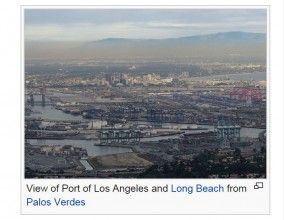How long will dock strife last?
 Things are different now for West Coast ports because of increased competition from Mexico and the Gulf Coast of the United States. So the ongoing strife over dockyard workers out here is likely to be resolved faster than in the past.
Things are different now for West Coast ports because of increased competition from Mexico and the Gulf Coast of the United States. So the ongoing strife over dockyard workers out here is likely to be resolved faster than in the past.
The City Wire reported the work stoppages may cost the West Coast economy $7 billion and increase meat prices even more.
Members of Congress seem aware of this and are pushing for a resolution. The Los Angeles Times reported:
Bipartisan group of House members on Thursday called for a “swift resolution” of the labor dispute at West Coast ports, warning that the cargo buildup and partial shutdowns were hurting businesses and posed a major risk to the U.S. economy.
“We believe this is the greatest threat our nation faces right now,” said Rep. Kurt Schrader (D-Ore.), who said businesses in his district have laid off workers because goods are not moving through the ports.
He and 15 House colleagues, including Majority Leader Kevin McCarthy (R-Bakersfield), held a news conference highlighting the damage the dispute is causing in their districts.
Gulf Coast
The disruption already is helping Gulf Coast ports grab business that may never return to the West Coast. According to JOC:
Container ship lines are adding calls at Houston to handle U.S. exports and imports whose regular routings to and from Asia have been disrupted by congestion at U.S. West Coast ports.
Houston is set for additional calls by Panamax vessels in the next several weeks, Roger Guenther, the port’s executive director, told JOC.com. He would not identify the carriers but said some are lines that don’t normally call the Texas port.
Ricky Kunz, the port’s vice president of trade development and marketing, said it’s not unusual for Houston to receive eastbound “extra loaders” that carriers add to accommodate customers. “But it’s usually in the peak season, not in February or March,” he said.
“Sweepers” to load U.S. exports are a new development for Houston, and have not been reported at other U.S. ports. Carriers usually add sailings only for the higher-volume eastbound leg of Asia-U.S. routes, not the westbound backhaul.
Mexico
And here’s another development — a possible future one — as reported in the Albuquerque Journal:
Mexico’s announcement this summer of plans for a multibillion-dollar investment by China in a new deep-water port and a railroad that would reach New Mexico’s border could expand international trade in the state exponentially.
Yet the proposed deal is so large – the more than $750 million reportedly planned for the railroad would far outstrip what China has invested in Mexico since 1999 – that it raises questions about its likelihood. At the same time, New Mexico’s buy-in to any cross-border rail plan would be crucial, yet the state has been largely on the sidelines.
New Mexico and its Mexican counterpart, Chihuahua, had been talking for years about the possibility of cross-border cargo rail at the fast-growing Santa Teresa port of entry. But New Mexico still had a call for proposals for a feasibility study when two Mexican governors traveled to Beijing in July and announced an agreement with developer China Hyway Group Ltd. and the China Development Bank. Chihuahua’s El Diario newspaper reported a planned investment of more than $750 million in a rail line and a $1 billion investment over four years in the construction of a deep-water port in the west coast state of Nayarit.
John Seiler
John Seiler has been writing about California for 25 years. That includes 22 years as an editorial writer for the Orange County Register and two years for CalWatchDog.com, where he is managing editor. He attended the University of Michigan and graduated from Hillsdale College. He was a Russian linguist in U.S. Army military intelligence from 1978 to 1982. He was an editor and writer for Phillips Publishing Company from 1983 to 1986. He has written for Policy Review, Chronicles, LewRockwell.com, Flash Report and numerous other publications. His email: [email protected]
Related Articles
Mayor Reed calls for deeper reforms
Steven Greenhut: California’s Democrats have become sudden believers in pension reform now that it’s clear that Gov. Jerry Brown’s tax-increase
Sen. Feinstein remarks on Iran deal, CA drought
Anyone wonder if U.S. Senator Dianne Feinstein has the same feeling expressed by Gov. Jerry Brown about a presidential run
Is there a UP/HSR rail war?
Anthony Pignataro: A huge assumption on the part of the California High-Speed Rail Authority is that they’ll be able to



